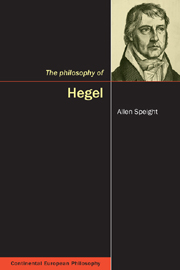Book contents
- Frontmatter
- Contents
- Acknowledgements
- Abbreviations
- Introduction
- 1 German Idealism and the young Hegel
- 2 The Phenomenology of Spirit
- 3 The Logic and Hegel's system
- 4 Ethics and politics
- 5 Hegel and the narrative task of history
- 6 Art, aesthetics and literary theory
- 7 Religion and philosophy
- Notes
- Guide to further reading
- Bibliography
- Index
6 - Art, aesthetics and literary theory
- Frontmatter
- Contents
- Acknowledgements
- Abbreviations
- Introduction
- 1 German Idealism and the young Hegel
- 2 The Phenomenology of Spirit
- 3 The Logic and Hegel's system
- 4 Ethics and politics
- 5 Hegel and the narrative task of history
- 6 Art, aesthetics and literary theory
- 7 Religion and philosophy
- Notes
- Guide to further reading
- Bibliography
- Index
Summary
Among the most striking features of the cultural and intellectual world in which Hegel came of age was its new and often enthusiastic appetite for art, which, together with an increasing sense of art's philosophical importance, may be said to be a characteristic element of the immediate post-Kantian era as a whole. This renewed exploration of art can be traced in an arc running from Kant's Critique of Judgment and Schiller's Letters on Aesthetic Education, through the endless journals and projects of the Romantics, to what finally emerge as the most ambitious attempts to present a comprehensive philosophy of art – the enormously detailed and systematically structured lectures on aesthetics given by Schelling and Hegel.
The sheer range of literary and artistic figures who help shape this period is extraordinary – Goethe, Schiller, Jean Paul Richter, Tieck, the Schlegels, Novalis, Hölderlin – but even more extraordinary is the extent to which each of those figures appears to be in significant dialogue with some or more of the central philosophical figures of the time – Kant, Fichte, Jacobi, Reinhold, Schelling, and ultimately Hegel. Dieter Henrich, whose own stress on the “constellation” of figures involved in the birth of German Idealism has inspired much of the last generation's research in this regard, is certainly right to note that there has hardly been “any time in history, before or after, in which the connection between literature and philosophy was as direct and mutual” as in the period following 1781.
- Type
- Chapter
- Information
- The Philosophy of Hegel , pp. 101 - 116Publisher: Acumen PublishingPrint publication year: 2008

